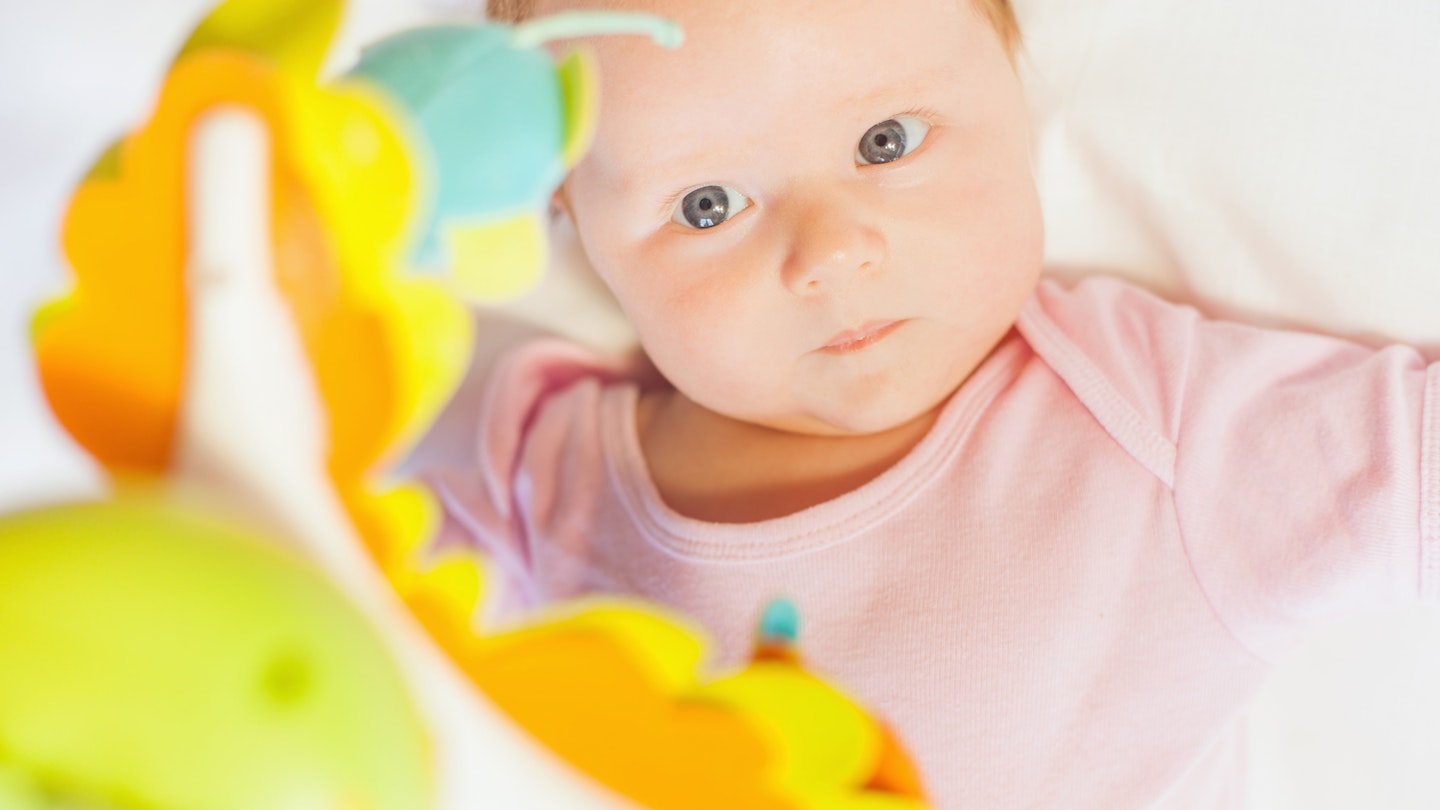Not sure what to do other than smile and shake a rattle? Here’s how to ensure you and your baby find playtime really fulfilling…
You may not think so, but you can start playing with your little one from birth.
‘Playtime is vital for bonding, the development of your baby’s motor skills and her hand-eye co-ordination,’ says baby expert Luiza DeSouza.
But while you may have a hamper full of tactile new toys at the ready, how do you use them effectively to entertain your newborn? ‘There are three key skills you need to engage with your baby: patience, openness and attentiveness,’ explains Luiza.
‘Use these during play with your little one and you will have a happy baby – and an even happier mother!’
Key skill 1: Patience
You’ve wiggled a sensory toy in front of your baby. And her response? Nothing. ‘Some mums feel silly if their baby doesn’t respond, so give up,’ says Luiza. ‘But my advice is to keep going. The key to this is patience. As humans we are impatient and easily frustrated.’
‘Simply singing to your baby while you change her nappy is playtime’
It’s helpful to widen your perspective of what constitutes play. ‘Simply singing to your baby while you change her nappy is playtime,’ Luiza adds. ‘Your newborn can hear well and see light and shade. To stimulate her, talk to her while moving around the room. She’ll turn her head to follow your voice. As her eyesight improves, she’ll follow you with her eyes.’
Another key game in the early weeks is tummy time. ‘Do this from one month old,’ says Luiza. ‘Put your baby on her playmat and get down to her level. If she doesn’t like tummy time at first, shake a rattle to distract her.’ Begin with just two minutes and slowly build it up as her muscles develop.
Always aim for eye contact during play. ‘From two months, play peek-a-boo, but remember to be patient,’ says Luiza. ‘Even if your baby doesn’t return the eye contact, don’t give up!’
Key skill 2: Attentiveness
You’ve got an email you have to send, a call you need to make and a Facebook post you really want to write…all while playing with your baby. ‘Stop!’ says Luiza. ‘Some mums use the time when they sit down to cuddle their baby to make calls and respond to emails. Do this and your baby won’t respond to you. She needs your full attention.’
‘Even shaking a rattle can be overwhelming’
The more you focus on your baby, the better you’ll understand what she wants. ‘Each baby is different,’ adds Luiza. ‘As humans, we are all different in the ways our bodies feel things. You need to pay attention to your baby. That way, you’ll notice your baby’s subtle signals and make sure she isn’t overwhelmed and overstimulated.’
Keep play gentle and quiet in the first three months. ‘Even shaking a rattle can be overwhelming,’ advises Luiza. ‘Be aware of your baby’s reaction. Shake the rattle just a little and then stop. Look at the world through your baby’s eyes and playtime will be far more fulfilling.’
Key skill 3: Openness
It’s all too easy to stick to the tried-and-tested games that you enjoy playing with your baby, but you should evolve and adapt. ‘Learn from those around you and try new ideas,’ says Luiza. And be open to the fact that even though your baby may be just a few weeks old, you can play with her.
‘Put some classical music on the radio while you have a cuddle’
‘From newborn to one month old, there is little time between your baby eating, having her nappy changed and going back to sleep,’ says Luiza. ‘This doesn’t mean there’s no room for play. Play a game while you’re changing her nappy. Put some classical music on the radio while you have a cuddle. Introduce her to shapes by drawing a simple picture like a cloud and putting it up in the crib, so she can look at it. You might not feel she’s gaining anything, but she’s benefitting enormously.’
Newborn games to try now
Here are some cute game ideas suggested by health visitor and author Sarah Beeson...
Name that tune: A baby often calms down to the music you played or sang while you were pregnant. See if she recognises the tunes while you gently sway her in your arms.
Ring, ring, is that baby calling? With your baby lying on her playmat, put her foot to your ear and pretend it’s a telephone. Have a chat with her on the ‘phone’ and lightly blow raspberries on the soles of her feet. This helps speech development. Plus, the gentle movement can also help alleviate trapped wind.
Who’s got the hat? This is a lovely way to introduce your baby to visitors. Take one of the baby’s hats and put in on her head. Sing: ‘[Baby’s name] got the hat, now what do we think of that? She passes the hat to Mummy, now Mummy’s got the hat.’ Put the hat on your head and repeat the song using your name and the name of a visitor. Pass the hat around the room and clap your hands in time to the song. Your little one will join in one day!
Follow the light: In a darkened room, shine a not-too-bright torch on the ceiling. Move the spot of light around and make up a story including the objects the light lands on. Your baby will enjoy following the light with her eyes and will learn about her surroundings.
Nude tummy time: Every now and then, try tummy time with your baby nappy-free on a washable blanket with some toys in front of her. She’ll love the freedom.
